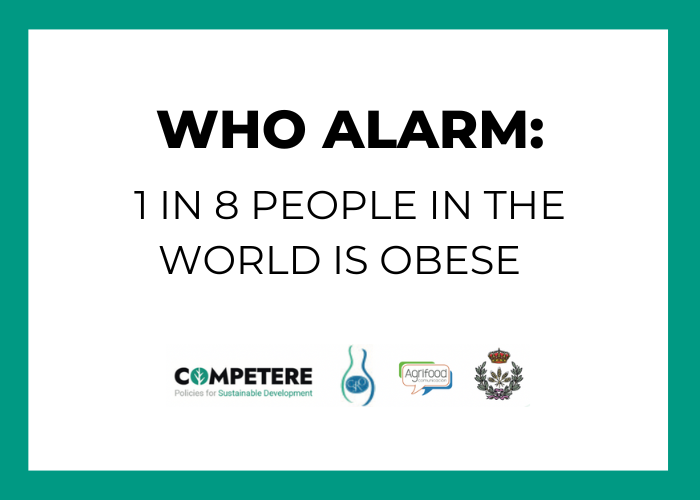WHO Alarm : 1 in 8 people in the world is obesePRESS RELEASE
- 21 May 2024
- Posted by: Competere
- Category: Senza categoria

Leggi il comunicato stampa in italiano
WHO ALARM: 1 IN 8 PEOPLE IN THE WORLD IS OBESE
Third gathering towards the formation of an international, multidisciplinary alliance on malnutrition
***
Madrid, 21 May 2024 – According to the WHO, since 1990, obesity among adults has doubled, while among adolescents it has quadrupled. In 2022, 1 in 8 people in the world were obese. In the same year, approximately 2.5 billion adults were overweight, of which 890 million were obese. In turn, more than 390 million children and adolescents were overweight, of which 160 million were obese.
There is, therefore, a growing rate of obesity, which coincides with a decline in the adoption of the Mediterranean diet. The tendency to gain weight is related to specific socioeconomic conditions. Individual genetic composition is a decisive factor in the process of weight gain, regardless of the person’s lifestyle. The policies adopted so far by the EU Commission, such as the front-of-pack labelling system, are not yielding any results.
These are the main issues that emerged from the international symposium “Malnutrition: a multidisciplinary approach”, which was held yesterday in Madrid. The event was organized by the Institute of Policy and Advocacy Competere – Policy for Sustainable Development, in collaboration with the communication and research platform Agrifood Communication, the Center for Study and Research on Obesity (CSRO) of the University of Milan and with the Polytechnic University of Madrid.
“Today, obesity is recognized internationally as an invisible epidemic, which has serious repercussions on public health, social and interpersonal relationships, productivity and the global economy, profoundly impacting the psychophysical well-being of citizens”, explained Pietro Paganini, President of Competere, in his opening remarks. «As the main cause of mortality worldwide, it is essential to intensify efforts to promote policies that favor its reduction, focusing attention on methods that allow citizens to adopt a balanced and sustainable lifestyle.”
Scientists, researchers and experts from the fields of medicine, economics, psychology, sociology and urban planning took part in the meeting, sharing specific recommendations to develop innovative strategies aimed at supporting national and international governments in the implementation of more effective public health policies against obesity.
The problem of obesity, and more broadly of overweight, affects a growing number of individuals in every geographical area of the planet.
“For the first time in history of humanity – Paganini continued – there is a concrete risk of reducing life expectancy, directly related to the widespread increase in population weight.”
The improvement of socioeconomic conditions and the greater availability of caloric foods, for which we must be satisfied, have contributed to an increase in body weight and therefore to the onset of diseases associated with incorrect diets and unsustainable lifestyles.
The problem of obesity is not exclusively attributable to the intake of excess calories, but it is also – and above all – the result of a complex mix of causes, including: nutrition and lifestyles, the quality, quantity and frequency of calorie consumption, along with energy expenditure; numerous aspects of lifestyle such as stress, sleep quality, emotional state, and medication intake; socioeconomic and relational factors, economic conditions and social dynamics; genetics and metabolism, and therefore genetic predispositions and individual metabolic variations.
Each of these macro categories it is influenced by further divisible, strictly individual sub-categories, underlining the need for a personalized approach to the problem.
The policies implemented to date, such as the Front-of-pack nutritional labeling system, have not lead to the desired results, limiting themselves to obtaining superficial consensus. Data analysis and evidence of their failure underline the urgency of reviewing political approaches, shifting attention from generalized solutions to more targeted and personalized interventions. Instead, they have proven to foster unintended negative and dangerous consequences .
In light of these challenges, it is essential to rethink public health strategies by focusing on individual needs to effectively address obesity. With technological progress and the evolution of personalized medicine, we now have the tools necessary to implement tailor-made solutions that can adapt to the specificities of each individual, opening new pathways for a more effective fight against this invisible epidemic.
“According to the WHO, obesity is the most urgent health problem for the international community.” Commented Michele Carruba, President of the Obesity Study and Research Center of the University of Milan. “Obesity must be addressed as a pandemic, whose growth trends are impressive, but also as a syndemic, a pathology that worsens when overloaded by other physical conditions (for example sedentary lifestyle or post-Covid infections). It is necessary to realize that obesity has now surpassed diseases attributable to malnutrition. In practice, more people die from overeating than from starvation. Without immediate intervention, which involves the creation of an integrated prevention system, obesity-related diseases will no longer be economically sustainable for national health systems.”
Felipe Casanueva, professor of medicine at the University of Santiago de Compostela and head of the Endocrinology and Nutrition Service of the University Hospital Complex of Santiago, added that “obesity is a serious chronic disease, which can no longer be treated by scientists and doctors alone. The number of overweight adults, adolescents and children has grown so much that political will is needed to address this situation, as was done with the anti-smoking law. It is a problem that must be addressed with a transversal, multidisciplinary and, above all, multi-party programme.”
.

